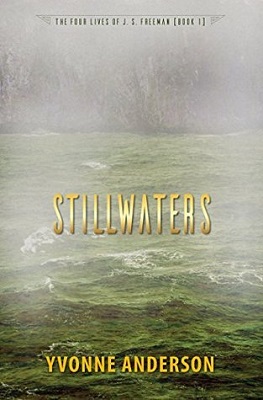 Stillwaters, by Yvonne Anderson (Gannah’s Gate Publishing, 2017)
Stillwaters, by Yvonne Anderson (Gannah’s Gate Publishing, 2017)
A novel written like an autobiography… about someone who’s famous on another planet. How’s that for a premise?
At the opening of Stillwaters, Jem (the narrator) is a feral child of perhaps twelve. Her “death” is the end of everything she ever knew and the beginning of a new life in a new place. The bulk of the novel traces her second life.
Although Jem’s home planet is much different than ours, some of the interpersonal struggles are quite relatable. We see the distrust between country and city folk (here, there’s the one City: either a benefactor or an oppressor, depending on your point of view). There’s distrust between the uneducated poor and the educated rich.
It’s interesting to watch a character like Jem, with deeply-held opinions and prejudices, learn to see her world differently as she becomes like those she once despised. Watch how she views her new surroundings soon after being taken from her wild existence:
All the plant life was tamed, confined to pots or standing alone and afraid in a bare expanse of gravel. [Kindle location 611]
And, much later:
At a time when many were discovering what an ugly place the world could be, I saw its beauty for the first time, now viewing it through the narrow lens of love. [Kindle location 4583]
This is in some ways a difficult novel to read. Jem’s traumatic beginnings have made her a foul-mouthed, hard-edged person. (Her world has different cuss words than ours, but the sheer volume wearied me at times.) Her experiences, past and in the novel, include some moments that are hard to read but discreetly presented.
In other ways it’s a treat to read. Yvonne Anderson nails world-building. I always enjoy the setting details she creates, exotic and yet relatable. In the middle of a tense time, there’ll be a spot of humour. And there’s heart. It’s good to see Jem grow and make something of herself.
Faith… Jem’s world has a number of religions, much like the gods and goddesses of Earth’s past. Jem doesn’t have much use for any of them. In the novel we find casual mention of a minor religion called Sonmanism, where “one god had a son who became a man.” [Kindle location 2947]
From the progression of the story, I think we’ll see the development of a Christian thread as the series progresses. For now, it’s begun but this isn’t your grandmother’s Christian fiction. It is, however, a well-written and worthwhile read. I’m glad I toughed through the hard parts.
Yvonne Anderson has previously written the Christian science fiction series, Gateway to Gannah. She describes her writing as “telling ‘the old, old story.’ In surprising new ways.” Stillwaters is book 1 in the series The Four Lives of J.S. Freeman. For more about the author and her work, visit yswords.com.
[Review copy from my personal library.]




